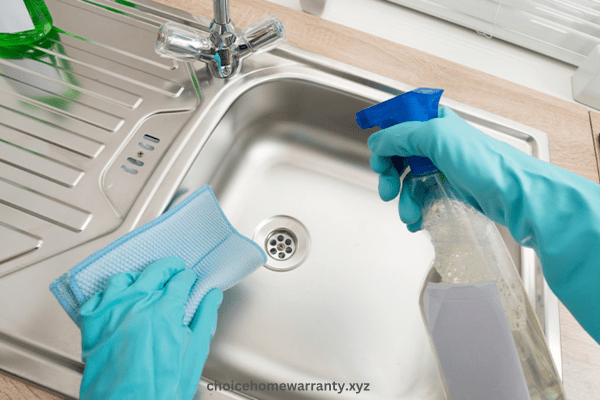Have you ever been assaulted by a foul, rancid odor wafting up from your sink drain, sending shivers down your spine? Most likely, this unwelcome stench can be attributed to a buildup of decomposing organic matter within the pipes. Food particles, grease, and hair often congeal in the drain, providing an ideal breeding ground for bacteria and mold.
Additionally, stagnant water can exacerbate the problem by creating a putrid environment where odorous substances thrive. Get rid of the sink drain smell for good! Discover the causes and effective solutions to eliminate that unpleasant odor. Say goodbye to the sink drain smell today. The noxious smell emanating from your sink drain might also be linked to a dried-out P-trap. This U-shaped pipe located beneath the sink is designed to trap water, acting as a barrier against sewer odors from seeping into your home.
However, if the P-trap dries out due to infrequent use or leakages, it loses its effectiveness and leads to unpleasant smells permeating through the drain. To prevent this issue, it’s essential to ensure that all drains receive regular use and that any leaks are promptly addressed—an important yet often overlooked aspect of maintaining good drainage hygiene.
Understanding the Problem
Understanding the problem of a foul-smelling sink drain can be more complex than it seems. Many people believe that the smell is simply due to food particles and grease buildup, but there are often other underlying reasons at play. One frequently overlooked factor is the growth of mold and bacteria in the dark, moist environment of the drain. This not only results in unpleasant odors but can also lead to health concerns if left unaddressed.
Furthermore, a sulfur-like smell emitted from the sink drain could indicate an issue with your water supply. Hydrogen sulfide gas can sometimes infiltrate water sources and create an offensive scent when released into drains. In addition, sewer gases can also seep into sink drains through plumbing issues, causing noxious odors to accumulate within the system. By understanding these various contributors to sink drain smells, individuals can take proactive steps to address them effectively.
Identifying the specific cause of a smelly sink drain is essential for implementing targeted solutions. While surface-level cleaning may offer temporary relief, delving deeper into potential mold growth, plumbing malfunctions, or even water quality issues is crucial for long-term odor elimination. Therefore, taking a comprehensive approach will not only improve air quality in your home but also safeguard your well-being.
1. Mold and Mildew
Mold and mildew growth in sink drains can lead to unpleasant odors emanating from the pipes. The accumulation of organic matter, such as food particles and grease, provides a breeding ground for mold and mildew to thrive. As these microorganisms decompose, they release foul-smelling gases that can cause the sink drain to emit a musty or rotten odor.
This is why sink drains can develop a persistent, unpleasant smell that lingers even after cleaning the visible surfaces. Addressing this issue requires thorough cleaning and disinfecting of the sink drain to eliminate mold and mildew growth and remove the source of the odor. Regular maintenance and proper disposal of food waste can also help prevent the recurrence of sink drain smells caused by mold and mildew.
2. Bacteria Growth
Bacteria growth in sink drains can lead to unpleasant odors that make the sink drain smell. The accumulation of food particles, grease, and other organic matter provides an ideal environment for bacteria to thrive. As these bacteria break down the organic material, they release foul-smelling gases that cause the unpleasant odor emanating from the sink drain. It’s important to regularly clean and maintain sink drains to prevent the buildup of organic matter and discourage bacterial growth, which will help eliminate the source of the bad smell.
3. Clogged Sewer Vent: A Trap for Unpleasant Gases
If you’ve noticed a foul odor coming from your sink drain, it could be due to a clogged sewer vent. When the sewer vent is obstructed, unpleasant gases can get trapped and seep into your home through the sink drain, causing a foul smell.
This can be particularly problematic in the kitchen, where food particles and grease can contribute to the buildup of debris in the drain. If left unattended, the smell may become increasingly noticeable and unpleasant. It’s important to address this issue promptly by clearing the clog in the sewer vent to eliminate the source of the odor and ensure proper ventilation for your plumbing system.
4. Sulfates: The Rotten Egg Smell
If you notice a rotten egg smell coming from your sink drain, it could be due to the presence of sulfates. Sulfates are naturally occurring compounds that can produce a foul odor reminiscent of rotten eggs when they react with certain bacteria in the drain.
The buildup of sulfates in the drain can lead to an unpleasant sulfuric odor wafting up from the sink. To address this issue, consider cleaning your sink drain thoroughly to remove any organic matter and bacteria that may be contributing to the smell. Additionally, using a drain cleaner specifically designed to target sulfates can help eliminate the odor and keep your sink smelling fresh.
5. Plumbing Errors: Post-Service Smells
Plumbing errors can often lead to post-service smells, leaving homeowners frustrated and concerned about the cause. One common issue that leads to unpleasant odors is a sink drain smell, which can be caused by a variety of factors. These may include debris buildup in the pipes, bacterial growth due to lack of proper cleaning, or even sewer line issues.
Understanding why your sink drain smells is crucial in addressing the root cause and finding an effective solution to eliminate the unpleasant odor once and for all. Professional plumbing assistance may be necessary to identify and rectify the source of the smell, ensuring a fresh and clean environment in your home.
6. Food debris buildup in the drain
If you’ve noticed a foul odor emanating from your sink drain, it could be due to a buildup of food debris in the drain. Over time, bits of food can get stuck in the drain and start to decompose, leading to an unpleasant smell. This is a common reason for sink drain odor, as the organic matter provides a perfect environment for bacteria to thrive and produce odors.
To address this issue, it’s important to regularly clean out your sink drain and ensure that food particles are not getting trapped. Using a mixture of baking soda and vinegar can help break down the organic matter and eliminate the odor.
7. Blocked Ventilation System
A blocked ventilation system can lead to unpleasant odors emanating from your sink drain. When a ventilation system is clogged, it can cause the water in the sink trap to be siphoned out, allowing sewer gases to enter your home and cause a foul smell.
This is often why many people wonder, Why does my sink drain smell? The accumulation of food debris, grease, and organic matter in the pipes can also contribute to the unpleasant odor coming from your sink drain. Regular cleaning and maintenance of the drainage system can help prevent these issues and keep your sink smelling fresh.

What To Do If Your Sink Drain Smells
Hot Water and Dish Soap: A Simple Solution
If you’re experiencing a smelly sink drain, a simple solution to try is using hot water and dish soap. This method is especially effective for mild odors or in newly installed sinks. Start by filling the sink with hot water and adding dish soap. Agitate the mixture and then let it flow through the drain, which can help to eliminate any unpleasant smells. This straightforward approach can be a quick and easy fix for dealing with common sink drain odors.
Ice, Lemon Peels, and Salt: A Natural Deodorizer
If you’re dealing with a smelly sink drain, and regular soap and hot water just aren’t doing the trick, try this natural deodorizing technique. Start by turning off your garbage disposal, then put some ice cubes and coarse salt down the drain. Run the garbage disposal to process them, then add some lemon peels to help eliminate both physical residue and odor. This simple yet effective method can help freshen up your sink drain when traditional methods fall short.
Baking Soda and Vinegar: The Dynamic Duo
If you’re wondering why your sink drain smells, the dynamic duo of baking soda and vinegar can come to the rescue. This effective DIY method involves pouring a cup of each down the drain, letting it sit for ten minutes, and then flushing it with boiling water. To ensure the odor is completely gone, finish by flushing with cold tap water. This simple yet powerful solution can help eliminate unpleasant sink drain smells and keep your kitchen smelling fresh.
When Should I Call a Professional?
If you notice a foul odor coming from your sink drain, it may be time to call a professional plumber. A smelly sink drain could be a sign of a clog or build-up of food particles, grease, or other debris in the pipes. Attempting to address the issue on your own with store-bought drain cleaners may not fully resolve the problem and could even damage your pipes.
A professional plumber can accurately diagnose the cause of the smell and provide effective solutions to ensure proper drainage and eliminate unpleasant odors. Don’t wait until the smell becomes unbearable—calling a professional at the first sign of trouble can prevent further issues and keep your sink drain functioning properly.
Conclusion
A foul odor emanating from your sink drain can be caused by various factors, including food debris buildup, mold and mildew growth, or a damaged p-trap. Understanding the potential causes of sink drain smells is the first step in addressing and resolving the issue.
Regularly cleaning your sink drain and utilizing natural remedies such as baking soda and vinegar can help eliminate odors and prevent them from returning. Additionally, seeking professional assistance may be necessary if the problem persists despite your efforts to remedy it. By taking proactive steps to maintain your sink drain, you can ensure a fresh-smelling and hygienic kitchen environment for you and your family.
FAQs About Sink Drain Smell
Can mold in the sink drain be harmful to health?
Mold in the sink drain can pose health risks, especially for individuals with respiratory issues. Regular cleaning and fixing of leaks are crucial to prevent mold growth.
Is the rotten egg smell from sulfates dangerous?
While not toxic, an excess of sulfates can cause issues like damage to clothing and digestive problems. It’s advisable to address the sulfate levels in your water.
How often should I clean my sink drain to prevent odors?
Regular cleaning, at least once a month, can help prevent the buildup of bacteria and debris that lead to unpleasant odors.
What should I do if DIY methods don’t eliminate the smell?
If home remedies fail, it’s time to consult a professional drain cleaner or plumber to identify and address underlying issues.
Can a clogged sewer vent cause long-term damage?
Yes, a clogged sewer vent can lead to drainage problems and persistent odors. Prompt attention and professional assistance are recommended to prevent long-term damage.
